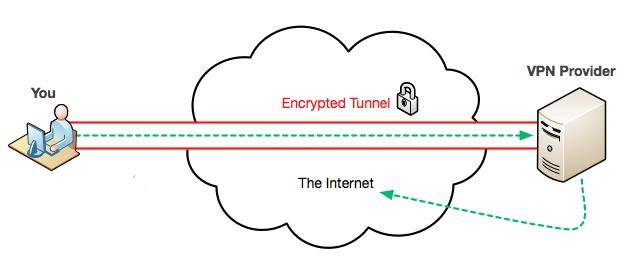Throughout the world of networking technologies, there is a lot of confusion about different terms and a VPN is one of those definitions. VPN stands for Virtual Private Network, which is actually quite a wide definition. The main reason for the confusion though is that the technology has developed over the years, so that today’s VPN is very different from the definition used 20 years ago.
For clarity a VPN was traditionally defined as a private network usually provided by a private service to carry voice and data. The more recent definition though has largely superseded this and it is now used commonly to describe a private, encrypted tunnel through the internet, an Internet VPN if you like and this is the definition we will focus on in this post.
What is a VPN used for ?
Well primarily security, a VPN provides a secure way to move packets of data across the internet. This data could be your web browsing, an email you sent, a post to your favorite forum – pretty much anything that leaves your tablet, desktop or PC. The vast majority of this data is normally sent in what’s known as ‘clear text’ meaning that the majority is readable by anyone between you and the recipient. This causes huge concerns obviously, especially if you’re sending passwords, usernames or other pieces of sensitive data. Some security has been bolted on to websites – by using the technology called HTTPS, the secure version of the common web protocol – HTTP. However this is largely only implemented in specific situations like logging on to secure web sites, for the vast majority of the time everything we do online is readable by anyone in between.
So the VPN supplies a method to protect all your data, not simply when you log on to something like a secure banking site. It actually creates a secure tunnel by taking all your data, encrypting it and then packaging (encapsulating in Geek talk!) it into new packets to be distributed securely using a VPN server.
Here’s a simple illustration, which demonstrates how your data is pushed down an encrypted tunnel across the internet.
Practical Uses of a VPN
- A VPN effectively changes your IP address by masking your real address, any web site or intermediary will only see the location and address of the VPN provider.
- VPN ensures that there is not a complete log of all your online activity at your ISP. Normally everything you do online is logged here, but a VPN means it’s all encrypted.
- You can hide your location with a VPN to access web sites that are normally restricted to specific locations. You do need to ensure that the VPN server you connect to is in that location – so to watch the BBC online you’d need a UK based VPN server.
- To circumvent internet filters and blocks instigated by countries like China, Turkey and even Australia
Ultimately a VPN provides privacy and security that simply doesn’t exist in the online world. Initially it was primarily used by companies and Governments to ensure that all there communication was kept secure. However now millions of private individuals use them or proxy servers routinely whether to watch Dr Who from the US or to bypass the Chinese filters on thousands of web sites. Want to use Facebook or Twitter in Iran, try using a VPN.
This video is worth watching for a brief introduction of how to use VPN Tunnel software
